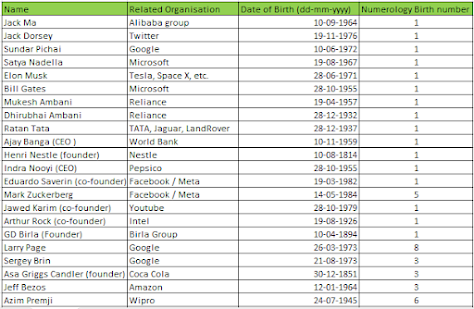Common about Top Businessmen & CEOs

According to numerology, individuals born with a birth number of 1 tend to possess certain characteristics and personality traits associated with that number. Here are some general traits often associated with people born with a birth number of 1: Leadership: People with a birth number of 1 are often natural leaders. They have a strong sense of self-confidence, assertiveness, and the ability to take charge in various situations. Independence: Individuals with a birth number of 1 value their independence and prefer to take control of their lives. They have a pioneering spirit and are not afraid to venture into new territories. Ambition: Those born with a birth number of 1 are often driven and ambitious. They set high goals for themselves and work diligently to achieve them. They have a strong desire to succeed and excel in their endeavors. Creativity: People with a birth number of 1 tend to be creative and innovative. They have original ideas and a uni...


